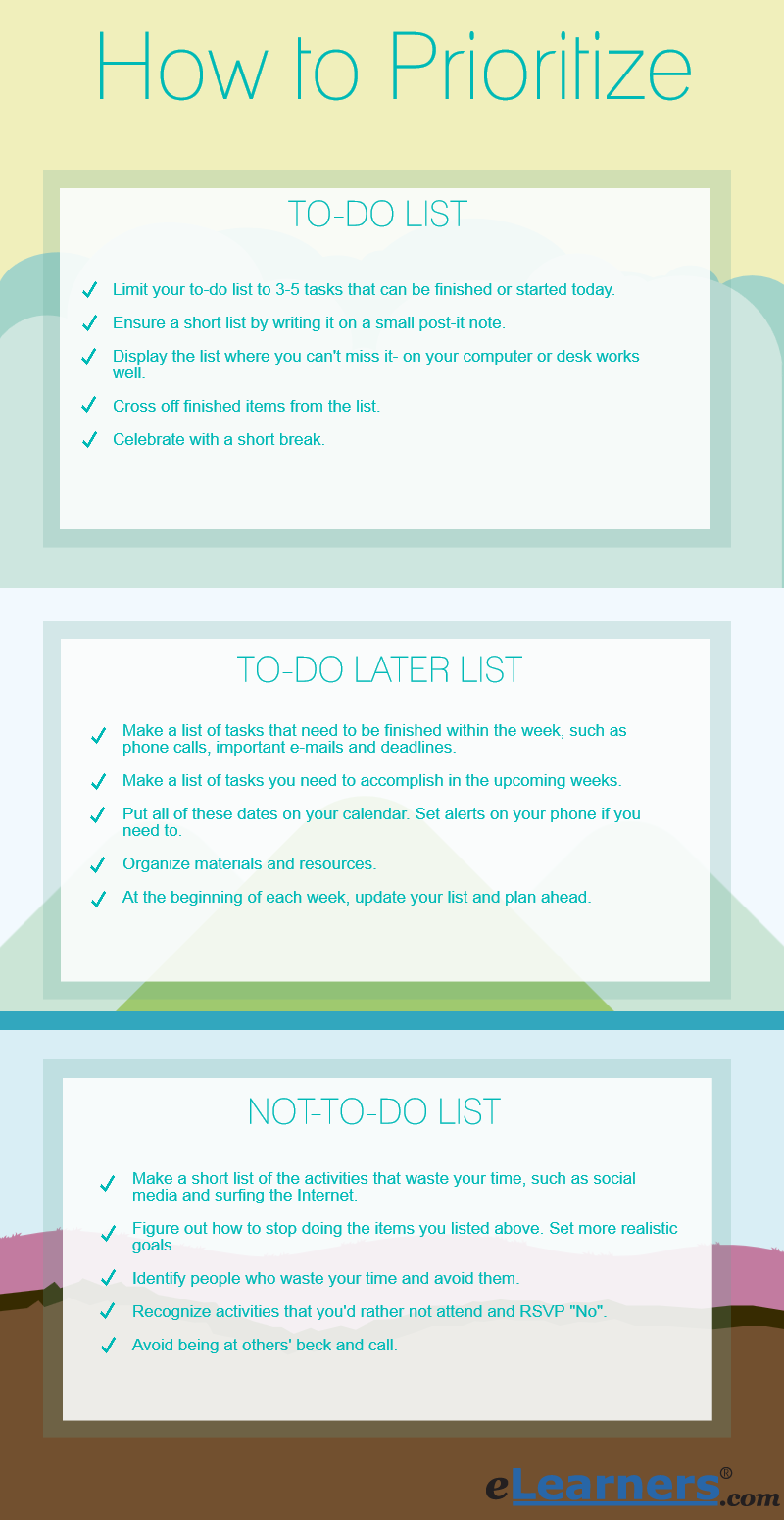
Alarms, alerts, reminders, lists, warnings, and bells are sounding off from our phones, computers and clocks – all prompting us to remember. Remember the deadline, the date, the conference, the meeting, the call, the term paper, and the test. The cacophony of the bells is enough to make you unplug these helpful assistants and quiet them for good.
The bells and whistles may help us remember to do something, but they’re not helpful in setting priorities. Which task needs to be done now? Which can be delayed until tomorrow or next week or later? Which should be scrapped completely?
To prioritize your tasks – call on an old fashioned technique called “the list.” But don’t stop with the common “to-do” list. These lists can become just as unwieldy and unhelpful as the chorus of beeps and dings emanating from your backpack. Create three lists: the to-do list, the to-do-later list, and the not-to-do list.
TO-DO LIST
Avoid a long, scrolling to-do list. It will simply serve to overwhelm and defeat you before you even look at item #1. The following steps will lead you to identify your top priorities.
- Make it short.
Limit your to-do list to 3-5 tasks that can be finished or started today. - Write it small.
Ensure a short list by writing it on a small post-it note. - Post it.
Display the list where you can’t miss it – on your computer, desk or forehead! - Done—and done.
Cross the finished items off the list. - It’s a party!
Celebrate with a short break.
Your new to-do list for tomorrow will begin with today’s unfinished business and will include a few new items.
TO-DO-LATER LIST
This list includes tasks you don’t want to forget—but they may be finished within the week or later. These are mid-level priorities that don’t require immediate attention but are on the horizon.
- This week.
Make a list of the tasks that need to be finished within the week, such as phone calls, important emails, deadlines for written assignments, and more. Consider doing similar activities at the same time, such as placing phone calls in one sitting. Focused attention is efficient. - Next week or later.
Then make a list of tasks that you need to accomplish in the coming weeks. These may include: deadlines for assignments and term papers, trips to the library to conduct research, online chats with fellow students or instructors, and more. - It’s a date.
For both short-term and long-term tasks, put the dates on your calendar. Be sure to include milestone activities for long-term tasks to avoid excessive work at the end. Set alerts on your computer or phone to remind you about important upcoming deadlines and tasks. - Organize materials and resources.
Analyze your upcoming tasks and identify the resources you will need—books, websites, e-meetings with fellow students, etc. Print instructions, maps, and other resources and file them in labeled folders. - New week, new list.
At the beginning of the week, update your list and plan ahead. Will family or work commitments cut into your usual study time? With advance planning, you can schedule early morning, lunchtime or late night study time to make up for the breaks.
NOT-TO-DO-LIST
Think you can’t squeeze more study time into your day? Betcha can! Spend a little time identifying your time wasters – and add more hours to your day. The items in your not-to-do list are lowest level priorities, and many block progress toward your top priorities.
- Make a short list of the activities that waste your time.
Watching television, incessantly checking email and Facebook, and surfing the Internet most likely are on your list. - Figure out how to procrastinate doing the items you listed in #1 above.
Instead of telling yourself to stop checking email (impossible), set a more realistic goal. For example, check email after lunch (possible!). Setting manageable guidelines for yourself increases the likelihood you’ll be able to follow through. - Identify people who waste your time.
Sure, helping people is nice, but what about that friend who always has an emergency? Don’t pick up the phone or answer the door. Let her solve her own drama. - Recognize activities that you’d rather not attend—and RSVP “No.”
Another Girls Night Out that turns into Gripe Night? Another shower or party for someone you hardly know? Just say, “No” and save your nights out for the people you really love and care about. - Avoid being at others’ beck and call.
Imagine your friend asks you to meet during your most productive personal study time. Negotiate for a different time, preferably during one of your least productive study hours. You can always compromise, but don’t be afraid to ask for what you need.
Writing these three short lists will help you identify and organize your priorities. Allowing too many low-level priorities into your day distracts you from the tasks at hand. Having too many “top” priorities can overwhelm and paralyze. So keep it short and sweet. Keep it real!

